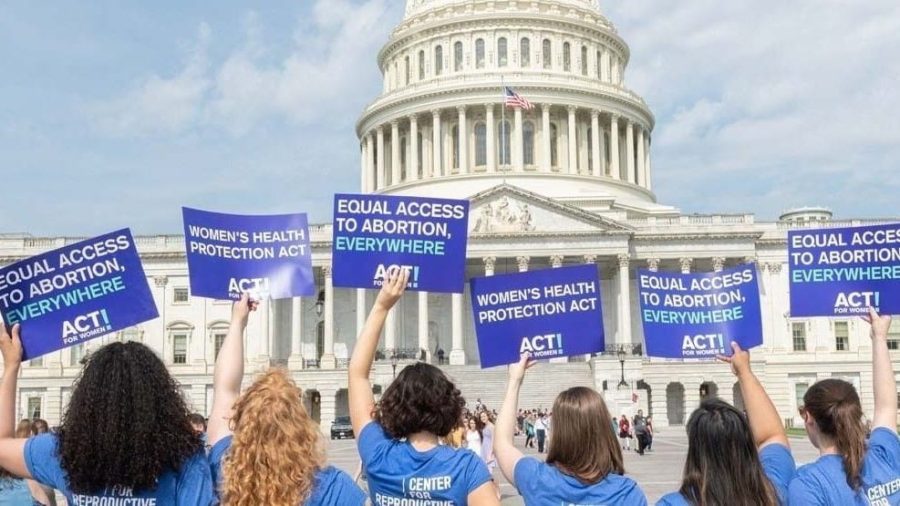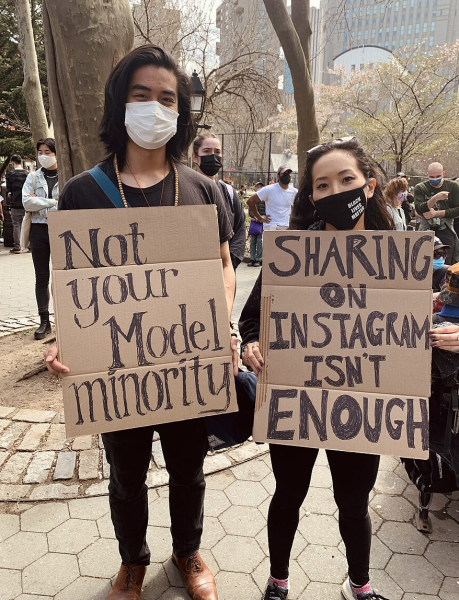The politicalization of women’s health
Congress’s failure to compromise and protect women’s rights will lead to additional problems down the road
Photo courtesy of the Center for Reproductive Rights
Demonstrators in front of the U.S. Capitol buidling
June 12, 2022
With emerging concerns about abortion access due to the leaked Supreme Court ruling on Dobbs v. Jackson, which would ban abortion, the passing of the Women’s Health Protection Act of 2021 (WHPA) would have meant the codification of abortion. The bill would restrict all governmental powers in medical decisions. The application of the supremacy clause would have made it so “governments may not limit a provider’s ability to prescribe certain drugs, offer abortion services via telemedicine, or immediately provide abortion services when the provider determines a delay risks the patient’s health.” This makes sense, since the government’s ultimate policymakers are politicians, not medical professionals. Decisions such as these, logically, should be left to medical professionals who have experience in their fields.
Further, the government is restricted in the sense that it cannot require a provider to perform unnecessary medical procedures, provide medically inaccurate information, comply with credentialing or other conditions that do not apply to providers whose services are medically comparable to abortions or carry out all services connected to abortion. Most importantly, the bill serves to protect women or anyone who is seeking an abortion. The Women’s Health Protection Act of 2021 (WHPA) is extremely necessary because the legislation addresses real concerns and problems that have arisen around abortion such as “unnecessary in-person visits before receiving abortion services or disclose their reasons for obtaining such services,” “[prohibited] abortion services before fetal viability or after fetal viability when a provider determines the pregnancy risks the patient’s life or health,” and restricted access to abortion care, all of which have been addressed by the bill.
The bill stood to codify abortion, which would override any ruling or intended ruling by the Supreme Court by exercising a form of checks and balances. Not one Republican voted for the bill despite some, such as Senator Susan Collins (R-Maine) and Senator Lisa Murkowski (R-Alaska), being pro-choice or pro-abortion rights. Instead, they back their own legislation, which has been dismissed by Democrats as too weak. But Collins and Murkowski see the WHPA as too liberal for them to ever vote for it, as proven by how they did not vote for it. The vote was 49-51, yea – nay, meaning if only one more person had voted for the bill, Vice President Kamala Harris would have broken the tie and passed the in-demand legislation.
Abortion rights are about to vanish. The Supreme Court will most likely officially release the Dobbs v. Jackson decision in late June or early July 2022. Congress must compromise. It is very simple to say, but abortion rights are in peril and danger. Enough of the Senate wants abortion legal; they simply cannot agree on the specific details. Although details are important, so is abortion access. Once their common goal is secured, then the details can be hashed out further; but the codification of abortion must happen. The lack of progress can also lead to another conclusion about the Senate and the government in general: they are too partisan for their own, and America’s good. This gridlock is a constant occurrence in the Senate, leading to absolutely nothing.
For better or worse, no change is happening. Congress’s ability and willingness to compromise is paramount to the future protection of abortion rights and America’s decision-making abilities.












